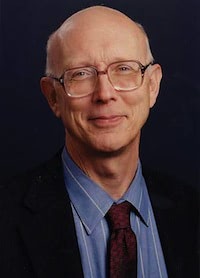- Undergraduate
Bachelor's Degrees
Bachelor of ArtsBachelor of EngineeringDual-Degree ProgramUndergraduate AdmissionsUndergraduate Experience
- Graduate
Graduate Experience
- Research
- Entrepreneurship
- Community
- About
-
Search
All Thayer News
George Whitesides as Thayer's inaugural Visionaries in Technology series speaker
Oct 18, 2012 | by Anna Fiorentino

For the inaugural event of Thayer School's Visionaries in Technology series, Harvard Professor of Chemistry Dr. George Whitesides discusses what he considers one of the world’s toughest jobs: Leading the Office of Naval Research, which entails listening to endless grant proposals and deciding what projects deserve funding. So the former head of ONR Fred Saalfeld came up with a strategy, known as the Saalfeld criterion, says Whitesides: “He’d stop people after the first three minutes and say, ‘assume all these lies you’ve told me will work as well as you say. Assume I give you all the money you ask for and more. Then the question is who cares?’ If they could answer the question, they’d get the money.”
That’s simplicity, a topic Whitesides, founder of Genzyme and 11 other companies, expects to be the most widely debated in science policy in the United States over the next 20 years. When students and faculty ask themselves why they are doing the research in the first place, the answer shouldn’t be to get ahead, to make money, or to satisfy their own curiosity, he says. With a simplicity approach, research should be done to solve a problem that will benefit society.
“Don’t get tangled up in the question of how much acetone you’ve poured from one beaker into another,” says Whitesides.
He claims that universities have gotten away from this simplicity-based approach. Over the years, they’ve adopted a more curiosity-driven approach to research, with the idea that curiosity produces radical solutions to problems and radical solutions are more effective than what would come from a more disciplined engineering approach. But Whitesides believes we need to get back to the roots of government-funded university research. The research that was of the US contributing to winning World War II through a combination of what Whitesides calls “Yankee grit and Yankee technology”—using radar, for example. “It was an important element of national security to have a strong research system, which would include activities both in corporations and in university,” he says.
In this video, Whitesides shares examples, including his own low cost paper-based liver function test, to make the case for why research should be driven by simple objectives and not just the sake of doing research:
Thayer School’s Visionaries in Technology series honors engineers and scientists whose insights have benefited humanity through revolutionary engineering solutions, paradigm shifting scientific advances, novel fields of inquiry, or policy shaping debate.
For contacts and other media information visit our Media Resources page.
